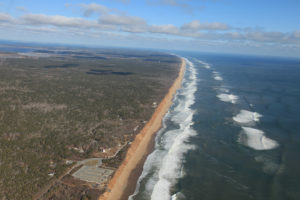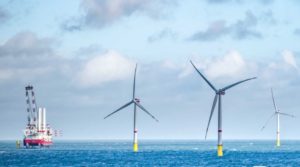BOSTON – A coalition of major public aquariums have announced that they are opposed to the federal government’s pending issuance of permits allowing for repeated seismic blasting along the East Coast in search of offshore oil and gas.
The New England Aquarium says that marine scientists are concerned that the prolonged and extreme noise pollution introduced into already highly stressed ocean environments will disturb marine life from tiny plankton to commercially valuable fish stocks to giant whales.
The Boston-based marine conservation organization has joined the National Aquarium in Baltimore, the Mystic Aquarium in Connecticut, the Virginia Aquarium & Marine Science Center, the North Carolina Aquariums and the New York Aquarium and parent Wildlife Conservation Society (WCS) in opposition to NOAA’s recent affirmation of the sound blasting program from Delaware to Florida.
“We do know that there are a range of effects from severe lethal mortality in a number of species as well as sub-lethal effects that effect the ability of animals to communicate with each other and find prey, which can essentially result in larger ecosystem effects,” said Mystic Aquarium’s Senior Researcher, Peter Auster.
“This is ultimately a decision about balancing the desire for exploration and finding new oil and gas deposits with our obligation as stewards of the environment. We just think that the decision that was made doesn’t consider all the risks and we hope that this garners greater scrutiny of the decision and then potentially other decisions down the road.”
Last week, NOAA gave the green light for the Bureau of Ocean Energy Management to launch a series of seismic surveys by private companies along the Atlantic coast.
These surveys use air guns that are towed behind ships and shoot loud blasts of compressed air through the water and miles into the seabed, which reflect back information about buried oil and gas deposits.
Air gun surveys produce intense explosions every 9 to 11 seconds for many weeks or months at a time.
The aquarium says that seismic surveys would be dangerous to the most critical life functions of marine mammals that depend upon sound to maintain contact with calves, locate food and find mates.
For the most endangered large whale species, the North Atlantic right whale, it will disproportionately affect the most vulnerable members of the population, mothers and calves.
This past year, there were no calves born in a population of just over 400 worldwide.
NOAA says it will limit seismic blasts from November to April in regions of the Atlantic where the right whales are known to migrate, and if whales are in the vicinity, blasts will not be allowed within 56 miles of an endangered animal.
Seismic exploration has also been shown to reduce singing in humpback whales, displace finback whales by hundreds of miles and disrupt activities vital to foraging and reproduction over vast ocean areas.
Fish and invertebrates are also impacted by seismic surveys, resulting in death, hearing loss, and movement patterns that can affect feeding and survival.
By TIM DUNN, CapeCod.com News Center
























